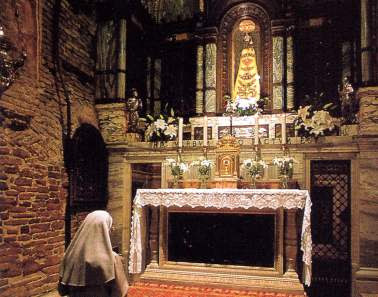Today the Carmelite Order celebrates the Solemnity of St John the Cross, co-reformer with St Teresa, and Doctor of the Church. St John is famous for his Dark Night of the Soul, and this has coloured many people's view of him. I remember talking to a religious about him but the sister was not too keen to engage: "He's very dark", she said, "All Dark Night". I suppose I could not blame her, when a theologian is taught as if he is a one trick pony, the richness of his theological teaching is not apparent or well known. John is much more than the Dark Night: he is also the Living Flame of Love and the beautifully amorous Spiritual Canticle. He has not been taught well. If we look at his biggest fan, for example - St Therese of Lisieux, we realise there is more to him than misery.
If you are looking for a good introduction to St John, to ease you into his work, go to
Ralph Martin. He is the author of that wonderful synthesis of the Mystical way,
The Fulfilment of All Desire. Ralph gets St John, and sees the magnificence of his teaching. During my retreat this year I used a series of Ralph's CDs on St John's theology as my talks and they were a revelation. Having read St John, Ralph brought new insights and a freshness. His basic understanding of St John - which is on the ball, is that he plots out the various steps of the spiritual life to help those who want to begin the journey to perfection here and now. It is a journey, Ralph explains, which we will all have to do either here on earth or, if we are lucky enough to get there - in Purgatory. The teaching on the two nights (Dark Night) - the night of the senses and the night of the spirit, are part of the journey where God purifies human desires and the soul, and so draw the person closer to union with him.
Of course all the talk about St John centres on his mystical theology, but what was he like? Many see him as a remote figure, very serious and distant: a man living on another plane, unable to identify with the ordinary person and their struggles, a mystic far above the ordinariness of life. Well, nothing could be further from the truth. Yes, John was quiet and serious, and St Teresa of Avila, who saw his qualities, also saw his faults, the strain of remoteness in his character. In her inimitable way she worked on him to bring out that beautiful soul. John was sensitive, he loved deeply, and so, I think, he may have taken shelter in his quiet nature. Gifted with many insights, he took life and faith seriously, and he was hard on himself. Teresa brought out his humanity, and she was successful. John was one of those people whom, when you met them, touch your soul and inspire love. His gentleness and simplicity impress.
Throughout his life, he inspired great loyalty - the sisters of the reform loved him to bits, even if they found him a hard taskmaster at times. When he was in prison, St Teresa's heart was breaking, and her sisters were praying day and night for his release. When he finally escaped, it was Discalced sisters who took him in, hid him and nursed him back to health. This experience would lead to his greatest works, which have allowed us a glimpse into his beautiful soul.
Reading St John, he is very different from St Teresa whose writing reveals her distinctive and lively voice: her work is all personality. John's is more sedate, but just as powerful. He is a great teacher, an understanding one and as he explains the mystical way, he does so using images to help us understand, repeating himself a great deal so we get the message. He is all heart as he tries to gently lead the soul on the path of holiness to union with God. No wonder little St Therese fell in love with him: he was, in fact, the one writer she could identify with - it was his teaching which helped her understand where she was, and proved to be a great consolation in her trial of faith. Another great saint who found St John's writings to be a great help in life was Pope John Paul II who wrote his doctoral thesis on St John of the Cross's teaching on faith. In these days as many struggle faith, and many are looking for God, St John points us to the path which leads into the Heart of Christ to find therein, the invitation to a union of souls.

















